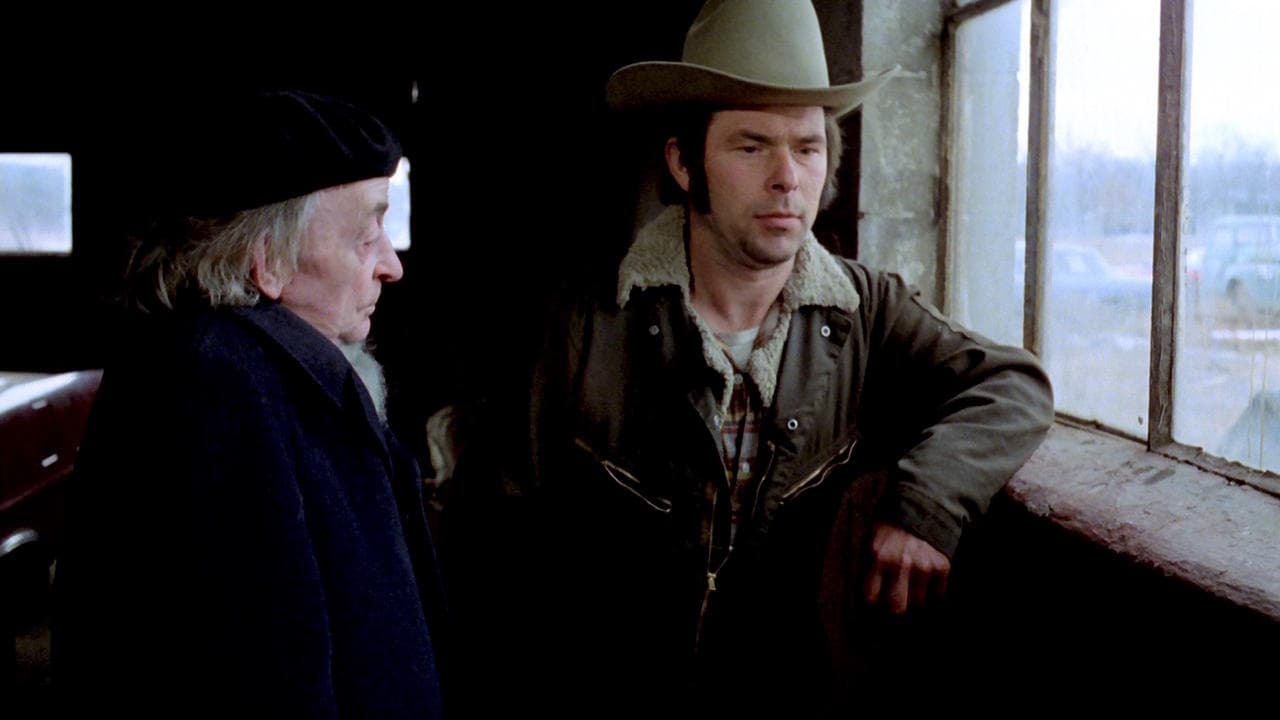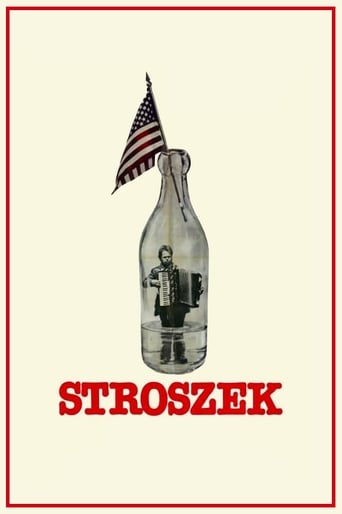

Although it has its amusing moments, in eneral the plot does not convince.
... View MoreIn truth, there is barely enough story here to make a film.
... View MoreOk... Let's be honest. It cannot be the best movie but is quite enjoyable. The movie has the potential to develop a great plot for future movies
... View MoreIt is interesting even when nothing much happens, which is for most of its 3-hour running time. Read full review
... View MoreA man's uncle, and said uncle's two dearest friends, an alcoholic recently released from prison and an abused prostitute, has come from Germany to live and work along w/him in Wisconsin. In America. The American Dream. The man, who is, in actuality, a minor character, if a somewhat vital one, is driving the three around the town in his truck. He's obviously a simple man, w/a thick, easily mockable accent and an oft present smile of the somewhat creepy variety, but he goes off to spew some fascinating dialogue right then and there. He explains that there have been four murders in that very town, and he believes that there was a fifth one, b/c one farmer drove away on his tractor one day and never returned, no explanations or traces left behind. The police looked into the case for some time, but gave up, but this man, steering a rusty, blatantly-low-quality(-to-put-it-rather-nicely) vehicle of stereotypical proportions, this man right here goes out to the frozen ponds near his home every Sunday w/a metal detector and looks for signs of this missing man's tractor. Besides a rather brief scene later on in the film, this little factoid is never really mentioned again, and Lord knows it has no real affect on the plot. In the grand scheme of things, this kind-of-(unintentionally, on his part)-goofy man gets little screen time in this film, and in almost any other film such dialogue would be seen as somehow "out of place," unnecessary; but, the truth is that it kind of IS necessary. Particularly in a film like 'Stroszek.' 'Stroszek' is a film about many things, but, upon my fourth viewing of it today, one of its themes stuck out among all others, and that theme is the presence of the absurd in our everyday lives. Many films explore such an idea, and so do even more works of literature , but 'Stroszek' does it even better than many of those works, no matter how masterful they be, as 'Stroszek' does it in such a way that feels so odd/surreal, but at the same time so unbelievably, undeniably REAL that I champion it as a pure masterpiece of the absurd. It is, of course, a masterpiece "of" many other things as well; including, but not limited to: tragedy, comedy, tragicomedy, cinema, & art. It is so funny, so sad, the performances are strange and different but completely pitch perfect and, in the end, absolutely outstanding. Everything about the filmmaking is done w/subtle mastery, and the simultaneous brutality and sensitivity of Herzog's storytelling is something else...out-of-the-extraordinary...beautiful, cruel, comic, violently devastating, a psychological trip through total paralyzing darkness w/sprinkles of likability and hilarity. Only a man w/such talent and eccentricity as Herzog can craft such a brilliant, weird, funny, cold, insightful, and heartbreaking masterpiece that serves as both a savage satire and uniquely sincere drama.
... View MoreFrom director Werner Herzog (Nosferatu the Vampyre, Fitzcarraldo, Grizzly Man), I confess that I do not remember much of this German film at all, not even watching all of it, but I know I did see it because it is in the book 1001 Movies You Must See Before You Die. Basically Berlin street performer Bruno Stroszek (Bruno S.) has been warned to stop drinking after being released from prison, but he immediately goes to a bar, where he meets prostitute Eva (Eva Mattes), who he comforts as she is down on her luck, and later he ends up beaten up by the pimps. Bruno and Eva decide to escape any more harassment from these people by escaping from Germany by moving to Wisconsin, America, and live with his American nephew Clayton (Clayton Szalpinski), so they start their journey, stopping off to do sight seeing in New York City. There Bruno gets a job with his nephew as a mechanic, and Eva works in a truck stop as a waitress, and the couple buy a trailer, but they trouble with the bills, so to stop the bank repossessing their home she is forced back into prostitution, but it isn't enough. After Eva leaves him, he starts a little bit of drinking again, and is forced to put the trailer up for auction, and after believing there is some kind of "conspiracy", he and his original elderly neighbour Scheitz (Clemens Scheitz) steal some money from a barbershop. The police catch and arrest Scheitz, but Bruno gets away, heading back to the garage, taking loads of beer and heading for the highway into the mountains, but forced to stop in a small town when the truck breaks down. Bruno sets the truck on fire, and the final time you see him is getting on a ski lift with a frozen turkey, then the police arrive, you hear a shot, and the last moments see a chicken playing the piano and a rabbit riding a toy fire truck, I don't know why, LOL. I did pay attention to the moments that mattered, were most interesting and would make it a "must see", such as a scene of the lead actor playing his accordion, and the strange ending, but I don't think it would have made much difference to me if I had paid more attention, it seemed a confusing story anyway, but what I did see and catch onto made an alright satirical drama. Worth watching, at least once, in my opinion!
... View MoreAt the climax of this somewhat tragic tale, Bruno, a German immigrant whose quest for happiness in America has failed, goes on an amateur, what-the-hell crime spree, turns on all the exhibits in a barren mid-winter Indian tourist trap, and climbs aboard a cable car for a final trip to the mountain top, carrying a shotgun and a frozen turkey. One of the exhibits he activates is a piano-playing chicken who hammers out an impeccable version of Schubert's Scherzo in B Minor. Another is a dancing chicken. The chicken walks out into a glass case, plucks a piece of string, and begins scratching atop a slowly revolving round table the size of an old record player. The Tribal Police arrive and examine the scene of the crime, which includes a burning truck and a recently robbed grocery store. One of the cops is on the squad car's radio. "We got a single passenger on the lift and an electrician's on his way out. Somebody turned on the electricity and we can't stop the dancing chicken." The director, Werner Herzog, lingers on that chicken, scratching away over and over on a revolving platter, his head completely empty of thought. What are we to make of all this? Except that we are all dancing chickens manipulated by some deranged outer force.If it isn't that, then I'm lost.A good case could be made that this movie is utterly pointless. Bruno, a shabby caricature of a man, is released from an institution and returns to his apartment in Berlin, where he has two friends. One is an elderly eccentric and the other an abused whore. The pixy-like old man carries on about how easy it is to get rich and live happily in America. The whore saves up her money and the three of them travel to a truck stop in Wisconsin. They buy a mobile home and a television set and things look bright for a while, until they fall behind in their mortgage payments.Sick of it all and desperate, the hooker takes off in one of the trucks for Canada. The old man goes bonkers and believes it's all a conspiracy, so he and the not-too-bright Bruno hold up a barber shop, run across the street, and begin buying groceries. The old man is arrested for armed robbery, Bruno steals a truck, takes off on his own, and finally runs out of money and gas at the Indian tourist trap.My old German grandpappy had a saying: "Ein Mann hat das Bodel und ein Mann hat das Gelt." Some people have money and others wind up with the bag. Bruno and his friends -- and even his enemies -- are losers from beginning to end. It's a long, slow story of social suicide. All three end up worse than they began, as bad as that was.And when I say "long", I mean "long." Herzog -- here as elsewhere -- has a tendency to hold on stylized shots for a long long long time. The camera is placed behind and above Bruno as a huge truck pulls his forfeited mobile home away. The camera remains static as the mobile home sluggishly departs to the right. The camera stays in the same place and so does Bruno, who is now staring at the empty space that his mobile home had occupied. He continues to stare as the seconds tick by and a scratchy old record plays a tune called "Silver Bells." If you're patient, and if you're sensitive to mood and character and composition, you'll get much more out of this movie than if you're expecting some plot-driven dynamo.I'd like to compare this to Robert Altman's exercises in improvisation but I can't. One senses an intentionality behind Herzog's stuff that's absent from Altman's movies. What I mean is, Herzog seems to have something in mind behind the apparent non sequiturs and stylized shots. Herzog has a goal, whereas many of Altman's movies seemed designed for nothing more than seeing what happened next. In a sense, Altman stays with the dancing chicken because that's all there is, while Herzog believes that there is somebody turning the machine on and off.
... View MoreHerzog reunites with Bruno S. The film begins with S. being released from jail after some public drunkenness. After some hard times involving his girlfriend's pimps, he and she (Eva Mattes) decide to accompany a friend who is moving to America. They end up in small town Wisconsin. Unfortunately, life is no better there. I have avoided this film for a while because, from the description, it sounded kind of anti-American and maybe particularly anti-Wisconsin, the state in which I grew up. Those fears were unfounded. Herzog, of course, is not that kind of guy, and he spends a lot of his time in the United States. This isn't even really a satire, like I thought it would be. Unfortunately, I don't think it's much of anything. Bruno S. is such a messed-up person (both in real life and in the characters he played for Herzog) that the fact that he can't adjust to life in America is neither surprising nor at all damning. It seems like life is going to be hard for the guy no matter where he goes. Because of that, it's kind of hard to get too invested in this movie. It never feels like Herzog had much of a plan for it, anyway, and it just kind of plods along. I did love the final sequence. I could watch that chicken dance for two hours.
... View More